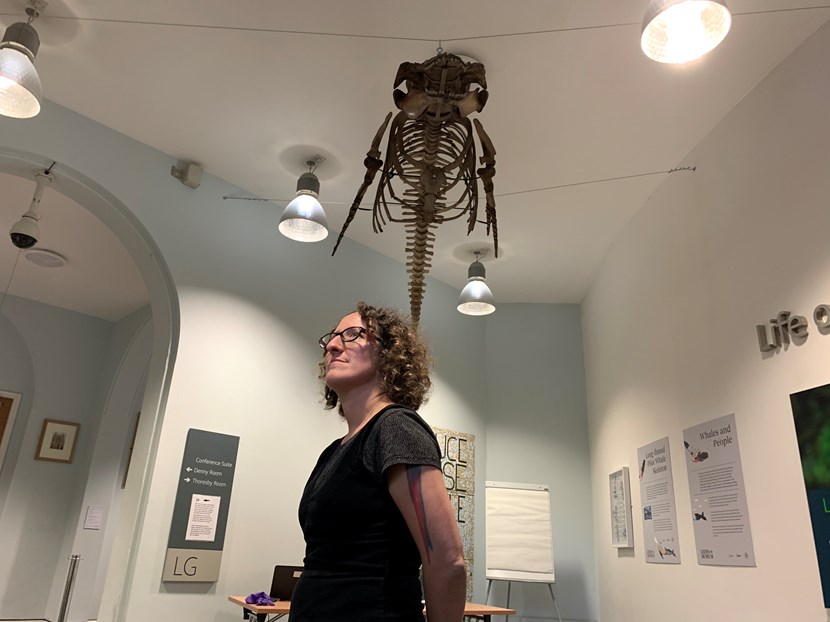
30 Oct 2019
Striking display brings museum’s Victorian whale to life
The remains of a Victorian whale cruelly killed by fishermen more than 150 years ago have been brought to life in a striking new display at Leeds City Museum.
After months of meticulous work behind the scenes reassembling hundreds of bones, the bones of the impressive long-finned pilot whale have been hung from the ceiling of the museum as part of a new project aimed at highlighting the fragility of our ocean ecosystems.
Made possible by money raised by National Lottery players, the project will also begin a programme of eco-friendly talks and events designed to encourage visitors to think about the part they can play in conservation and protecting the planet’s vulnerable species.
And the whale’s name, chosen through a public competition has also been revealed. The pilot whale has been christened Swale, a play on the Yorkshire way of saying “it’s a whale.”
The marine mammal was collected off the coast of Leith in Scotland back in 1867 after its pod was spotted by a group of fishermen. They stranded the animals and killed the entire group for meat and blubber.
Funding from the Leeds Philosophical and Literary Society, the Friends of Leeds City Museums and the National Lottery Heritage Fund has allowed it to be cleaned, conserved and articulated.
Cambridge University Zoology Museum also loaned their long-finned pilot whale teeth to be used for moulds and palaeontologist Nigel Larkin helped conserve and articulate the bones for display.
Clare Brown, Leeds Museums and Galleries’ curator of natural sciences, said: “It’s amazing to see the whale reassembled and on display in such dramatic fashion and it really helps to emphasise what a beautiful and incredible animal it must have been.
“It’s our hope that seeing our whale from this new perspective and learning more about its very sad story will not only capture the imaginations of our visitors, but also encourage them to think about our oceans and what they can do to support the spectacular array of life which calls them home.
“We have a responsibility, individually and collectively, to help protect the planet’s vulnerable species and to do all that we can to ensure that future generations still have the opportunity to share the world with such amazing and inspiring creatures.”
Usually found in the North Atlantic and Southern Hemisphere, long-finned pilot whales take their name from their unusually long pectoral fins and the belief that groups had a leader, or “pilot”.
Councillor Judith Blake, leader of Leeds City Council, said: “This poignant display is a huge credit to the technical skill and imagination of our museums and galleries team and being able to experience the story of this magnificent animal in such a visually striking way is sure to be a captivating experience for visitors.
“Conservation and environmental action are key issues for us all and museums have an important role to play bringing the past to life for visitors and inspiring them to think about how they can change the future.”
Reaching more than 6.5 metres in length and weigh more than five tonnes, pilot whales live in large groups of up to 150, feeding mostly on fish and communicating while they hunt with a series of characteristic clicks, whistles and buzzes.
Tens of thousands of long-finned pilot whales were captured and killed in the 1940s and 50s by the whaling industry.
ENDS
For media enquiries, please contact:
Stuart Robinson
Communications Officer
Leeds City Council
Tel: 0113 378 9182
Email: stuart.robinson@leeds.gov.uk
Notes to editors:
About The National Lottery Heritage Fund
Using money raised by the National Lottery, we Inspire, lead and resource the UK’s heritage to create positive and lasting change for people and communities, now and in the future. www.heritagefund.org.uk.
Follow @HeritageFundUK on Twitter, Facebook and Instagram and use #NationalLotteryHeritageFund
About Leeds City Museum
Leeds City Museum, Millennium Square, Leeds, LS2 8BH
https://museumsandgalleries.leeds.gov.uk/leeds-city-museum
0113 378 5001
FREE admission
Facebook/Twitter/Instagram: LeedsCityMuseum
Leeds City Museum was established in 1819 and reopened on 13 September 2008, having moved to the former Mechanics’ Institute located on Millennium Square in the centre of Leeds. With four floors and six galleries to visit, the museum offers an exciting, fun and interactive day out for all the family. The museum collection spans ancient and contemporary history, the local area and the wider world. The museum’s temporary exhibition space hosts a changing programme of exhibitions, currently A City and its Welcome, open until 31 December 2019.
The museum was named winner of the Kids in Museums ‘Family Friendly Museum of the Year 2018’. Family activities and school holiday events take place throughout the year including craft sessions at Rory’s Saturday Club, Tiny Tigers for under 5s and Museum Minis. The museum has dedicated conference and events spaces, with in-house catering provided by Leeds City Museum Café. The museum welcomed 283,138 visitors in 2018.
For media enquiries contact:
Leeds City Council Communications team
communicationsteam@leeds.gov.uk